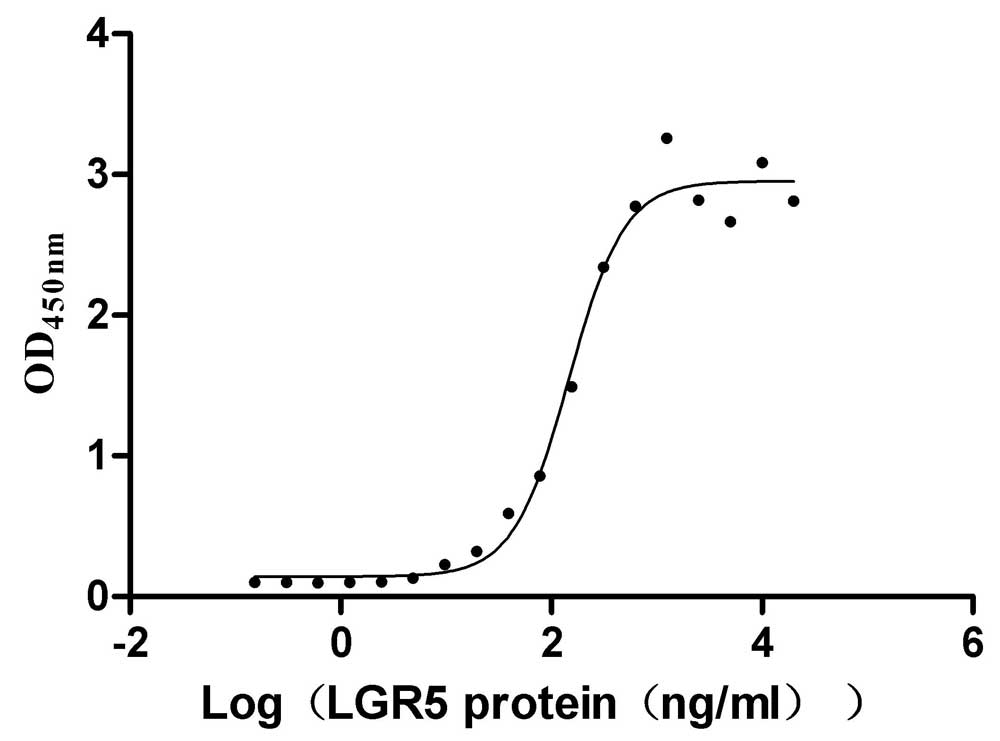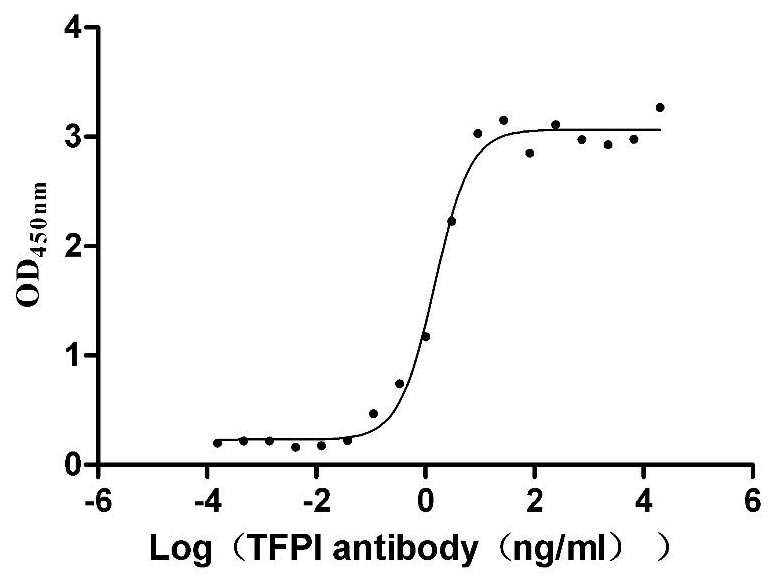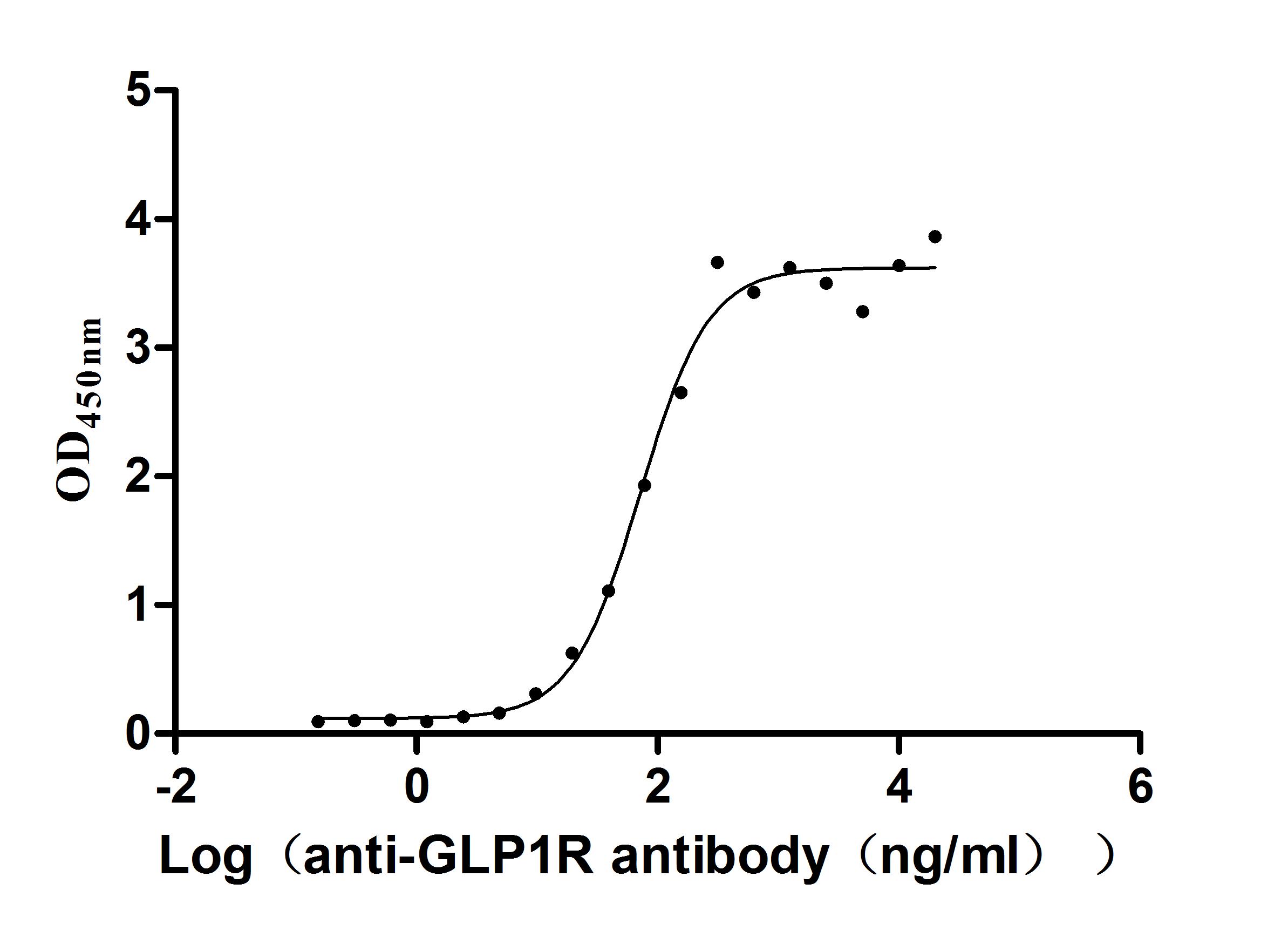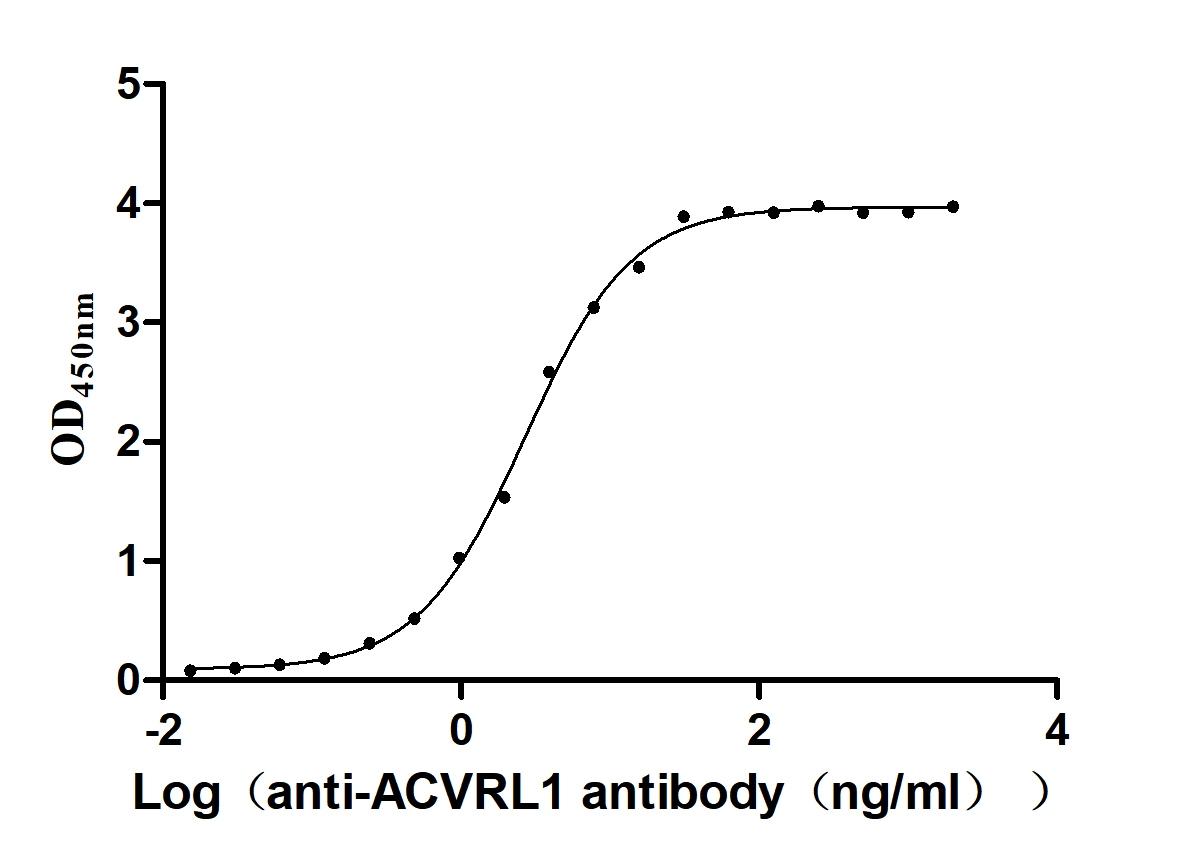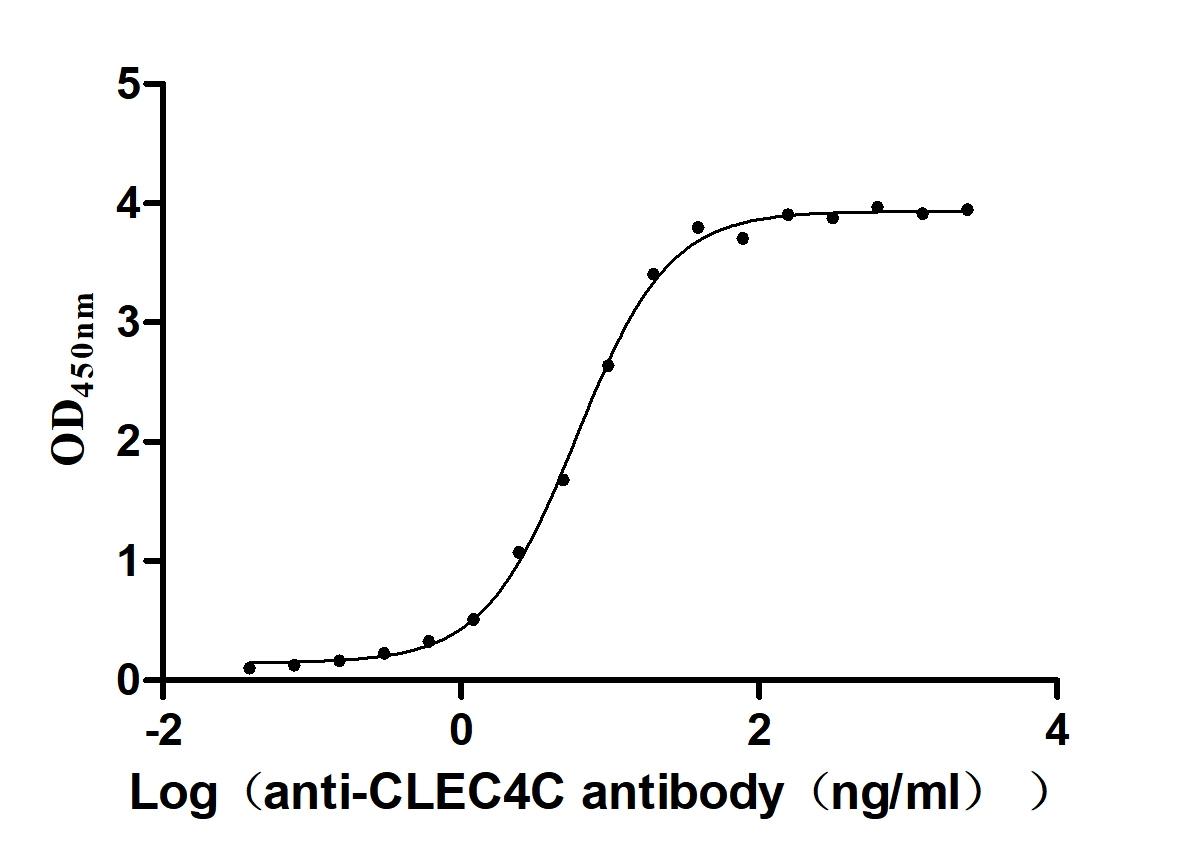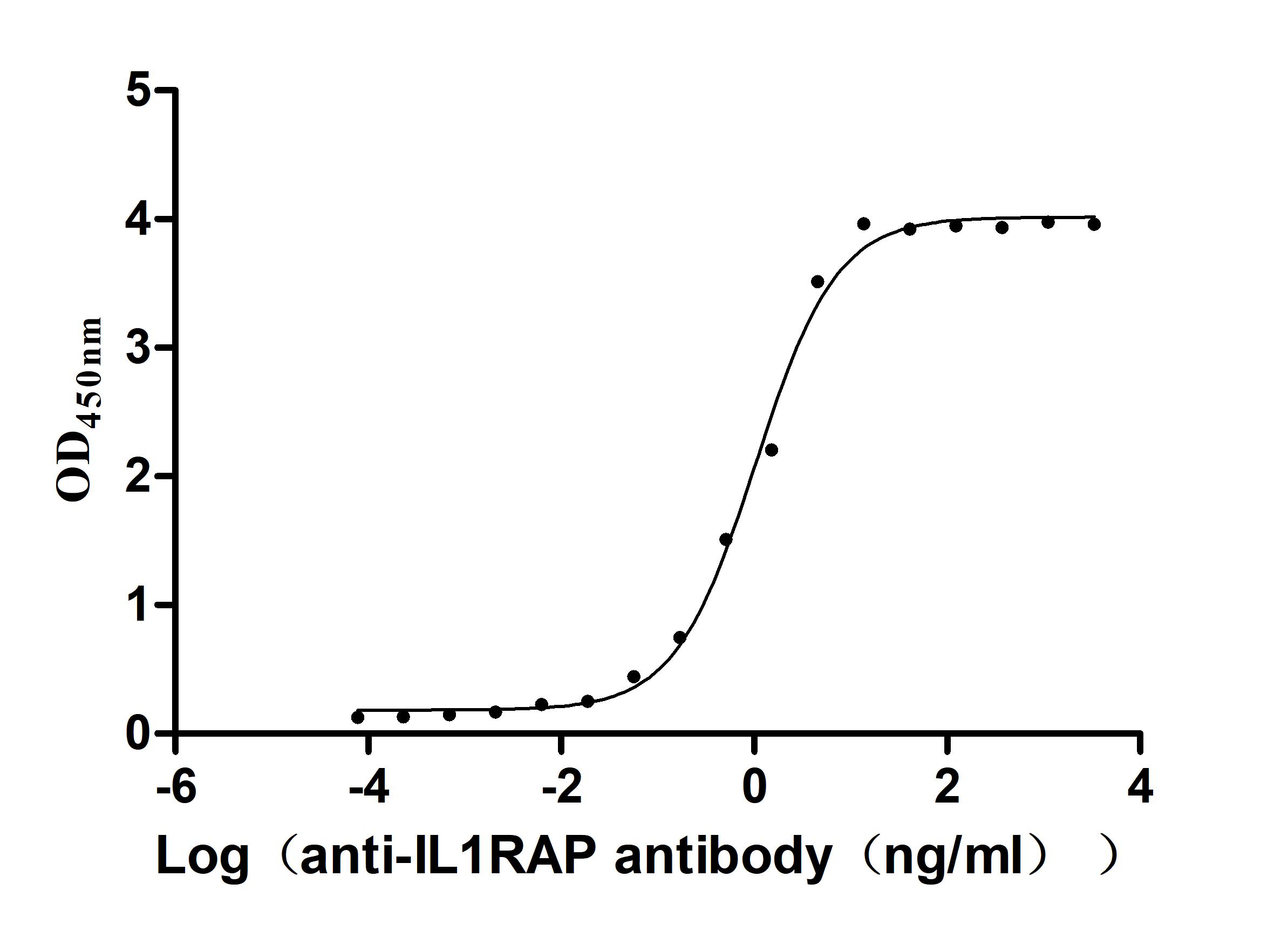Recombinant Mouse Protein kinase C beta type (Prkcb)
-
货号:CSB-YP018700MO
-
规格:
-
来源:Yeast
-
其他:
-
货号:CSB-EP018700MO
-
规格:
-
来源:E.coli
-
其他:
-
货号:CSB-EP018700MO-B
-
规格:
-
来源:E.coli
-
共轭:Avi-tag Biotinylated
E. coli biotin ligase (BirA) is highly specific in covalently attaching biotin to the 15 amino acid AviTag peptide. This recombinant protein was biotinylated in vivo by AviTag-BirA technology, which method is BriA catalyzes amide linkage between the biotin and the specific lysine of the AviTag.
-
其他:
-
货号:CSB-BP018700MO
-
规格:
-
来源:Baculovirus
-
其他:
-
货号:CSB-MP018700MO
-
规格:
-
来源:Mammalian cell
-
其他:
产品详情
-
纯度:>85% (SDS-PAGE)
-
基因名:
-
Uniprot No.:
-
别名:Prkcb; Pkcb; Prkcb1Protein kinase C beta type; PKC-B; PKC-beta; EC 2.7.11.13
-
种属:Mus musculus (Mouse)
-
蛋白长度:Full Length of Mature Protein
-
表达区域:2-671
-
氨基酸序列ADPAAGPPP SEGEESTVRF ARKGALRQKN VHEVKNHKFT ARFFKQPTFC SHCTDFIWGF GKQGFQCQVC CFVVHKRCHE FVTFSCPGAD KGPASDDPRS KHKFKIHTYS SPTFCDHCGS LLYGLIHQGM KCDTCMMNVH KRCVMNVPSL CGTDHTERRG RIYIQAHIDR EVLIVVVRDA KNLVPMDPNG LSDPYVKLKL IPDPKSESKQ KTKTIKCSLN PEWNETFRFQ LKESDKDRRL SVEIWDWDLT SRNDFMGSLS FGISELQKAG VDGWFKLLSQ EEGEYFNVPV PPEGSEGNEE LRQKFERAKI GQGTKAPEEK TANTISKFDN NGNRDRMKLT DFNFLMVLGK GSFGKVMLSE RKGTDELYAV KILKKDVVIQ DDDVECTMVE KRVLALPGKP PFLTQLHSCF QTMDRLYFVM EYVNGGDLMY HIQQVGRFKE PHAVFYAAEI AIGLFFLQSK GIIYRDLKLD NVMLDSEGHI KIADFGMCKE NIWDGVTTKT FCGTPDYIAP EIIAYQPYGK SVDWWAFGVL LYEMLAGQAP FEGEDEDELF QSIMEHNVAY PKSMSKEAVA ICKGLMTKHP GKRLGCGPEG ERDIKEHAFF RYIDWEKLER KEIQPPYKPK ARDKRDTSNF DKEFTRQPVE LTPTDKLFIM NLDQNEFAGF SYTNPEFVIN V
-
蛋白标签:Tag type will be determined during the manufacturing process.
The tag type will be determined during production process. If you have specified tag type, please tell us and we will develop the specified tag preferentially. -
产品提供形式:Lyophilized powder
Note: We will preferentially ship the format that we have in stock, however, if you have any special requirement for the format, please remark your requirement when placing the order, we will prepare according to your demand. -
复溶:We recommend that this vial be briefly centrifuged prior to opening to bring the contents to the bottom. Please reconstitute protein in deionized sterile water to a concentration of 0.1-1.0 mg/mL.We recommend to add 5-50% of glycerol (final concentration) and aliquot for long-term storage at -20℃/-80℃. Our default final concentration of glycerol is 50%. Customers could use it as reference.
-
储存条件:Store at -20°C/-80°C upon receipt, aliquoting is necessary for mutiple use. Avoid repeated freeze-thaw cycles.
-
保质期:The shelf life is related to many factors, storage state, buffer ingredients, storage temperature and the stability of the protein itself.
Generally, the shelf life of liquid form is 6 months at -20°C/-80°C. The shelf life of lyophilized form is 12 months at -20°C/-80°C. -
货期:Delivery time may differ from different purchasing way or location, please kindly consult your local distributors for specific delivery time.Note: All of our proteins are default shipped with normal blue ice packs, if you request to ship with dry ice, please communicate with us in advance and extra fees will be charged.
-
注意事项:Repeated freezing and thawing is not recommended. Store working aliquots at 4°C for up to one week.
-
Datasheet :Please contact us to get it.
靶点详情
-
功能:Calcium-activated, phospholipid- and diacylglycerol (DAG)-dependent serine/threonine-protein kinase involved in various cellular processes such as regulation of the B-cell receptor (BCR) signalosome, oxidative stress-induced apoptosis, androgen receptor-dependent transcription regulation, insulin signaling and endothelial cells proliferation. Plays a key role in B-cell activation by regulating BCR-induced NF-kappa-B activation. Mediates the activation of the canonical NF-kappa-B pathway (NFKB1) by direct phosphorylation of CARD11/CARMA1 at 'Ser-559', 'Ser-644' and 'Ser-652'. Phosphorylation induces CARD11/CARMA1 association with lipid rafts and recruitment of the BCL10-MALT1 complex as well as MAP3K7/TAK1, which then activates IKK complex, resulting in nuclear translocation and activation of NFKB1. Plays a direct role in the negative feedback regulation of the BCR signaling, by down-modulating BTK function via direct phosphorylation of BTK at 'Ser-180', which results in the alteration of BTK plasma membrane localization and in turn inhibition of BTK activity. Involved in apoptosis following oxidative damage: in case of oxidative conditions, specifically phosphorylates 'Ser-36' of isoform p66Shc of SHC1, leading to mitochondrial accumulation of p66Shc, where p66Shc acts as a reactive oxygen species producer. Acts as a coactivator of androgen receptor (ANDR)-dependent transcription, by being recruited to ANDR target genes and specifically mediating phosphorylation of 'Thr-6' of histone H3 (H3T6ph), a specific tag for epigenetic transcriptional activation that prevents demethylation of histone H3 'Lys-4' (H3K4me) by LSD1/KDM1A. In insulin signaling, may function downstream of IRS1 in muscle cells and mediate insulin-dependent DNA synthesis through the RAF1-MAPK/ERK signaling cascade. Participates in the regulation of glucose transport in adipocytes by negatively modulating the insulin-stimulated translocation of the glucose transporter SLC2A4/GLUT4. Phosphorylates SLC2A1/GLUT1, promoting glucose uptake by SLC2A1/GLUT1. Under high glucose in pancreatic beta-cells, is probably involved in the inhibition of the insulin gene transcription, via regulation of MYC expression. In endothelial cells, activation of PRKCB induces increased phosphorylation of RB1, increased VEGFA-induced cell proliferation, and inhibits PI3K/AKT-dependent nitric oxide synthase (NOS3/eNOS) regulation by insulin, which causes endothelial dysfunction. Also involved in triglyceride homeostasis. Phosphorylates ATF2 which promotes cooperation between ATF2 and JUN, activating transcription.
-
基因功能参考文献:
- our results suggest that the decrease in the activity of cPKCbetaII and cPKCgamma, especially cPKCgamma, may play key roles in the pathogenesis of diabetic encephalopathy. PMID: 29744369
- These results suggest that CD40-activated CD40L reverse signalling has striking and opposite effects on the growth and elaboration of dendrites among major classes of brain neurons by PKC-dependent mechanisms. PMID: 29111976
- The absence of gut microbiota from birth was shown to be associated with decreased CREB expression, followed by decreases of protein kinase C beta (PRKCB) and AMPA receptors expression, and an increase of phosphorylation CREB (pCREB) expression. PMID: 27444685
- These results provide a molecular explanation of how initiation of B cell activation discriminates substrate stiffness through a PKCbeta-mediated FAK activation dependent manner. PMID: 28755662
- high glucose stimulates PKCbeta signaling, which leads to MR stabilization and its transcriptional activities. PMID: 28966330
- propose that PKCbeta acts to suppress the degradation of FTO protein and reveals the associated role of PKCbeta and FTO in adipogenesis, suggesting a new pathway that affects the development of obesity and metabolic diseases PMID: 28626026
- Cytosolic NELL2 specifically interacts with PKC beta isotypes and inhibits PKC beta1 through direct binding to the N-terminal pseudosubstrate domain of PKC beta1. PMID: 25450684
- Taken together, these data argue for a complex mechanism of PKCbeta-dependent regulation of p66 activation involving Ser(139) and a motif surrounding Ser(213). PMID: 27624939
- Translocation of PKC-betaII from the cytoplasm to membranes is required for phagocytosis of apoptotic cells and is inhibited by soluble beta-glucan PMID: 26745713
- repressor of myogenesis; opposes calcineurin function PMID: 26081415
- has a key role in the differentiation of osteoclasts PMID: 25256217
- PKCbeta2 inhibition protects mice from gut ischemia-reperfusion injury by suppressing the adaptor p66(Shc)-mediated oxidative stress and subsequent apoptosis. PMID: 24722289
- STAT3 bound to previously undescribed negative regulatory elements within the promoter of PRKCB, which encodes PKCbetaII. PMID: 24550541
- These findings indicate that the identity of the calcium-dependent PKCbeta that mediates PTP controls the mechanism and functional consequences of Posttetanic potentiation. PMID: 24794094
- The activation of protein kinase C beta (PRKCB), negatively modulates the mitochondrial energy status and inhibits autophagy. PMID: 23778835
- Specific protein kinase C-beta activation in the endothelial cells caused dysfunction and accelerated atherosclerosis. PMID: 23759514
- PKCbeta-mediated p110gamma phosphorylation disconnects PI3Kgamma from its canonical inputs from trimeric G proteins. PMID: 23824069
- Prkcb is a genetically sensitive step likely to contribute substantially to population variability in anti-polysaccharide antibody levels. PMID: 23552399
- Data indicate that inhibition of protein kinase Cbeta (PKCbeta) by LY-317615 ameliorates experimental autoimmune encephalomyelitis (EAE). PMID: 23959874
- PKCbeta is the isoform responsible for Syk negative regulation. PMID: 23960082
- AngII induced serine phosphorylation and tyrosine phosphorylation in IRS2 via PKC-Beta activation. PMID: 23775122
- Our results uncover a novel role for PKCbeta in modulating CD11c expression and inflammatory response of macrophages in the development of diabetic atherosclerosis. PMID: 23766264
- hyperglycemia-induced PKCbeta2 activation requires caveolae and is associated with reduced Cav-3 expression in the diabetic heart. PMID: 23474486
- PKCtheta;/beta and CYLD are antagonistic partners in the NFkappaB and NFAT transactivation pathways in primary mouse CD3+ T lymphocytes. PMID: 23335970
- PKCbeta deficiency abrogated lupus-associated phenotypes in SLE mice. Inhibition of PKCbeta enhanced apoptosis of B cells from SLE mice. Treatment of SLE mice with the PKCbeta-specific inhibitor enzastaurin prevented the development of lupus. PMID: 23280626
- PKCbeta plays a definitive role in the metabolic switch to glycolysis following BCR engagement of naive B-cells. PMID: 22994860
- Loss of 1 allele of PKCbeta delayed CLL onset. Loss of both abrogated CLL development. Though the PKCbeta signal is not needed for the development of CD5+ nonmalignant B cells in TCL1 transgenic mice, its contribution to CLL transformation is indispensible. PMID: 19168795
- delta opioid receptor activation inhibits anoxia-induced Na(sodium)+ influx through Na+ channels via PKC, especially via PKCbetaII and PKCtheta; isozyme-dependent mechanisms in the cortex. PMID: 22609332
- Inhibition of protein kinase C beta ameliorates impaired angiogenesis in type I diabetic mice complicating myocardial infarction. PMID: 22313801
- Findings suggest that PKCbeta deficiency may prevent genetic obesity, in part, by remodeling the catabolic function of adipose tissues through beta-ARs dependent and independent mechanisms. PMID: 22210924
- APE1 suppresses oxLDL-induced p66shc activation in endothelial cells by inhibiting PKCbetaII-mediated serine phosphorylation of p66shc, and mitigates vasoconstriction induced by activation of PKC. PMID: 21467074
- unrecognized role of PKCbeta in fine tuning diet-induced cholesterol and bile acid homeostasis, thus identifying PKCbeta as a major physiological regulator of both triglyceride and cholesterol homeostasis. PMID: 21550971
- Results suggest that betaIPKC takes part in the processes that maintain ESCs in their undifferentiated state. PMID: 20936827
- Coronary artery PKC-beta II is not altered in diabetic mice lacking Gna11. PMID: 21190563
- In-depth analysis using site-directed mutagenesis revealed that PKCbetaI could phosphorylate Ser(3) of the eEF1A2 isoform and that the association between eEF1A2 and PKCbetaI was dependent on the phosphorylation status of eEF1A2 PMID: 20923971
- PKC betaII and PKC delta/theta; mediate BMP-4-induced osteoblastic differentiation. PMID: 20971075
- Data identify the smooth muscle-specific regulatory role of PKCbetaII in neointimal expansion in response to acute arterial injury. PMID: 20594553
- Results suggest that the CD44 and PKC play an important role in diabetes and interaction of high-molecular weight HA with these proteins may reduce inflammation and secondary pathologies due to this disease. PMID: 20713153
- Data show that protein kinase C beta is a key mediator of insulin-mediated activation of hepatic SREBP-1c and its target lipogenic genes. PMID: 20179320
- Activation of a classical PKC in skeletal muscle is sufficient to cause disturbances in whole-body glucose and lipid metabolism followed by profound alterations in oxidative capacity, ectopic fat deposition and physical activity. PMID: 20569275
- PKCbetaII and PKCdelta counter-regulate BBB permeability during aglycemic hypoxia. PMID: 19900507
- Our results suggest PKCbeta1 functions as an inhibitory protein for tumor growth and metastasis dissemination PMID: 19132529
- Characterization of protein kinase C beta isoform's action on retinoblastoma protein phosphorylation, vascular endothelial growth factor-induced endothelial cell proliferation, and retinal neovascularization. PMID: 11805327
- role in controlling nuclear factor kappaB activation in B cells through selective regulation of IkappaB kinase alpha PMID: 12070292
- protein kinase C beta activation is dependent upon phosphatidylserine receptor action PMID: 12114511
- mobilization of protein kinase C beta in macrophages induced by Listeria monocytogenes affects it internalization and escape from the phagosome PMID: 12117979
- PKC-beta controls I kappa B kinase lipid raft recruitment and activation in response to BCR signaling. PMID: 12118249
- glucose induces membrane recruitment of this enzyme in living pancreatic islet beta-cells PMID: 12149258
- Interaction of "readthrough" acetylcholinesterase with RACK1 amd this protein correlates with intensified fear-induced conflict behavior PMID: 12509514
- The expression of specific PKC isotypes was significantly changed as embryonic stem cells differentiated into cardiomyocytes. PMID: 12648500
显示更多
收起更多
-
亚细胞定位:Cytoplasm. Nucleus. Membrane; Peripheral membrane protein.
-
蛋白家族:Protein kinase superfamily, AGC Ser/Thr protein kinase family, PKC subfamily
-
数据库链接:
KEGG: mmu:18751
STRING: 10090.ENSMUSP00000070019
UniGene: Mm.207496
Most popular with customers
-
Recombinant Human HLA class II histocompatibility antigen gamma chain (CD74), partial (Active)
Express system: Mammalian cell
Species: Homo sapiens (Human)
-
Recombinant Human R-spondin-1 (RSPO1), partial (Active)
Express system: Mammalian cell
Species: Homo sapiens (Human)
-
Recombinant Human Tissue factor pathway inhibitor (TFPI), partial (Active)
Express system: Mammalian cell
Species: Homo sapiens (Human)
-
Recombinant Human Glucagon-like peptide 1 receptor (GLP1R), partial (Active)
Express system: Mammalian cell
Species: Homo sapiens (Human)
-
Recombinant Human Serine/threonine-protein kinase receptor R3 (ACVRL1), partial (Active)
Express system: Baculovirus
Species: Homo sapiens (Human)
-
Recombinant Macaca fascicularis C-type lectin domain family 4 member C(CLEC4C), partial (Active)
Express system: Mammalian cell
Species: Macaca fascicularis (Crab-eating macaque) (Cynomolgus monkey)
-
Recombinant Macaca fascicularis Interleukin 1 receptor accessory protein(IL1RAP), partial (Active)
Express system: Mammalian cell
Species: Macaca fascicularis (Crab-eating macaque) (Cynomolgus monkey)


-AC1.jpg)
